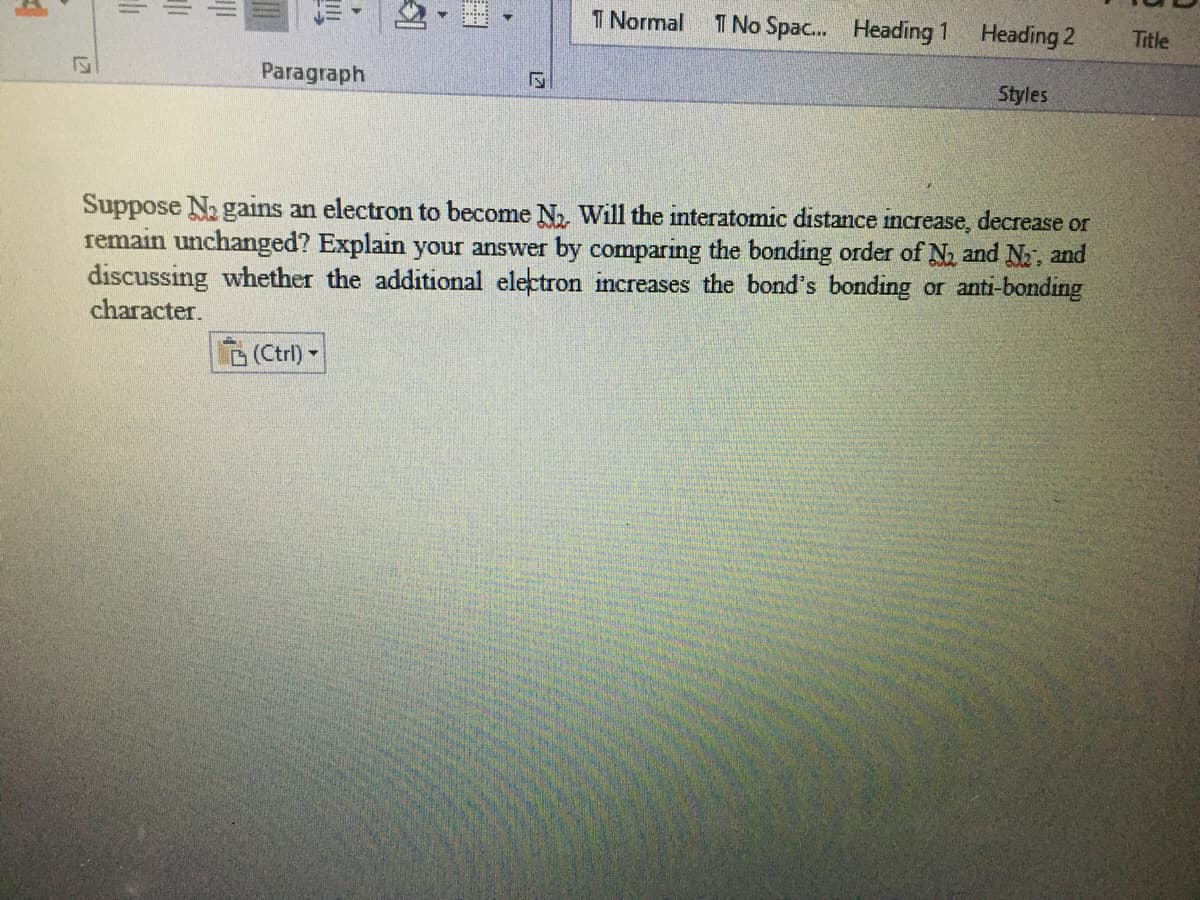Suppose N2 gains an electron to become N2. Will the interatomic distance increase, decrease or remain unchanged? explain your answer by comparing the bonding order of N2 and N2- and discussing whether the additional electron increases the bond’s bonding or anti-bonding character.
Suppose N2 gains an electron to become N2. Will the interatomic distance increase, decrease or remain unchanged? explain your answer by comparing the bonding order of N2 and N2- and discussing whether the additional electron increases the bond’s bonding or anti-bonding character.
Chemistry: Principles and Practice
3rd Edition
ISBN:9780534420123
Author:Daniel L. Reger, Scott R. Goode, David W. Ball, Edward Mercer
Publisher:Daniel L. Reger, Scott R. Goode, David W. Ball, Edward Mercer
Chapter10: Molecular Structure And Bonding Theories
Section: Chapter Questions
Problem 10.101QE: The molecular orbital diagram of NO shown in Figure 10.47 also applies to OF. Draw the complete...
Related questions
Question
Suppose N2 gains an electron to become N2. Will the interatomic distance increase, decrease or remain unchanged? explain your answer by comparing the bonding order of N2 and N2- and discussing whether the additional electron increases the bond’s bonding or anti-bonding character.

Transcribed Image Text:T Normal
T No Spac. Heading 1
Heading 2
Title
Paragraph
Styles
Suppose Na gains an electron to become N. Will the interatomic distance increase, decrease or
remain unchanged? Explain your answer by comparing the bonding order of N and N, and
discussing whether the additional electron increases the bond's bonding or anti-bonding
character.
(Ctrl) -
Expert Solution
This question has been solved!
Explore an expertly crafted, step-by-step solution for a thorough understanding of key concepts.
This is a popular solution!
Trending now
This is a popular solution!
Step by step
Solved in 2 steps

Knowledge Booster
Learn more about
Need a deep-dive on the concept behind this application? Look no further. Learn more about this topic, chemistry and related others by exploring similar questions and additional content below.Recommended textbooks for you

Chemistry: Principles and Practice
Chemistry
ISBN:
9780534420123
Author:
Daniel L. Reger, Scott R. Goode, David W. Ball, Edward Mercer
Publisher:
Cengage Learning

Principles of Modern Chemistry
Chemistry
ISBN:
9781305079113
Author:
David W. Oxtoby, H. Pat Gillis, Laurie J. Butler
Publisher:
Cengage Learning

Organic Chemistry: A Guided Inquiry
Chemistry
ISBN:
9780618974122
Author:
Andrei Straumanis
Publisher:
Cengage Learning

Chemistry: Principles and Practice
Chemistry
ISBN:
9780534420123
Author:
Daniel L. Reger, Scott R. Goode, David W. Ball, Edward Mercer
Publisher:
Cengage Learning

Principles of Modern Chemistry
Chemistry
ISBN:
9781305079113
Author:
David W. Oxtoby, H. Pat Gillis, Laurie J. Butler
Publisher:
Cengage Learning

Organic Chemistry: A Guided Inquiry
Chemistry
ISBN:
9780618974122
Author:
Andrei Straumanis
Publisher:
Cengage Learning

Chemistry: The Molecular Science
Chemistry
ISBN:
9781285199047
Author:
John W. Moore, Conrad L. Stanitski
Publisher:
Cengage Learning

Chemistry: Principles and Reactions
Chemistry
ISBN:
9781305079373
Author:
William L. Masterton, Cecile N. Hurley
Publisher:
Cengage Learning
